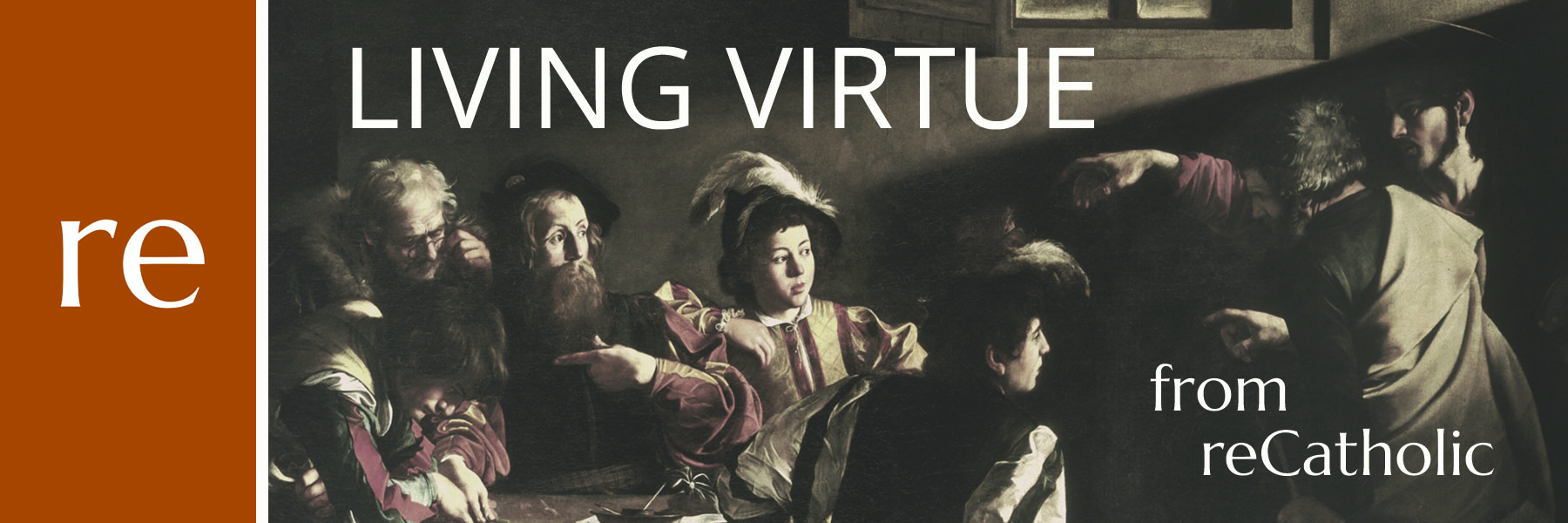
Virtue – Charity
Charity is loving God as our beloved friend, because He loved us first. We also love other people because God loves them, and we desire that they reach heaven to be happy with God forever.
1. Understand Charity
What is Charity?
Charity and love are both words that describe this virtue which is the height of all the other virtues. We need both faith and trust in God in order to live good lives, however, love is the ultimate goal we were created for.
In heaven, we will no longer need faith or trust, because we will see God directly. But for all eternity we will live in God’s love and share that love with all the angels and saints.
In this life, we begin our relationship with God through the gift of baptism. By every single free decision during our lives, we cause this relationship to either decrease or increase, as we reject or respond to God’s love for us. In other words, until our last day on this earth, we will always be capable of loving more, by serving God and our neighbor.
From the Catechism
CCC 1844: By charity, we love God above all things and our neighbor as ourselves for love of God. Charity, the form of all the virtues, “binds everything together in perfect harmony” (Col 3:14).
The Virtue Lived – St. John the Apostle
 St. John was born a few years after Jesus, around 6 AD in Galilee. His parents were Zebedee and Salome; his brother St. James was also an Apostle. They were a family of fishermen who lived on the Sea of Galilee, North of Jerusalem.
St. John was born a few years after Jesus, around 6 AD in Galilee. His parents were Zebedee and Salome; his brother St. James was also an Apostle. They were a family of fishermen who lived on the Sea of Galilee, North of Jerusalem.
Chosen by Jesus as one of his twelve Apostles, St. John is often referred to as “the disciple whom Jesus loved.” He was privileged to join Jesus, with Peter and James, in a few of His most intimate moments, such as the Transfiguration and Jesus’ agony in the garden.
John is known for his close relationship with Jesus. He wasn’t afraid to love Him as both God and man, in a deeply passionate way. He laid on Jesus’ chest at the last supper, and despite the dangers, was present, alongside the Blessed Virgin Mary, at the foot of the cross.
He became the guardian of the Blessed Mother after Jesus’ death. Fittingly, he is the patron saint of loyalty, friendship, and love.
Besides writing one of the Gospels, and the Book of Revelation, St. John penned some of the Church’s most beautiful teachings on God’s love in his epistle:
Beloved, let us love one another, because love is of God; everyone who loves is begotten by God and knows God. Whoever is without love does not know God, for God is love. In this way the love of God was revealed to us: God sent his only Son into the world so that we might have life through him. In this is love: not that we have loved God, but that he loved us and sent his Son as expiation for our sins. Beloved, if God so loved us, we also must love one another. (1 Jn 4:7-11)
2. Virtue In My Life
Spiritual Questionnaire
Questions geared towards self knowledge and personal growth
Struggles
- Who are the people I struggle with the most? What is it about them that makes it hard for me to get along with them?
- Am I able to forgive people’s faults and give them another chance?
- Am I ever mean to others? What is it that I’m trying to achieve when I deal with others unkindly?
- How do I hurt others the most: Is it physically, through my words, by lack of sharing, or even by not showing them that I care, etc.?
- Do I understand that it’s possible to feel bad about someone, and still act kindly towards them, out of love for Jesus?
Highlights
- Who are my best friends? Why do I treat them differently than others?
- What is one of the best ways for me to support others? What are some traits of my personality that I can regularly share with my friends and family?
- Can I remember a time when I forgave someone? How did that make me feel?
- Have I ever gone out of my way to spend time with or support someone in need? How could I do this more often?
Prayer
- Do I pray for others’ needs? Do I pray for everyone, or just for my friends and family?
- Do I ask God to help me treat others well? Especially those people that I struggle to get along with.
- Do I make sure to confess my sins of jealousy, or thinking and speaking ill of others?
- Do I regularly pray about the things that I struggle with, asking God to help me change?
3. Growing In Virtue
A Prayer for Virtue
Good Jesus, despite my sins, You want to be my friend. You give to everyone without judging or counting the cost. Give me a heart like Yours, willing to sacrifice myself for others as You did for me. Amen.
St. John the Apostles // Pray for us
Practical Tips for Living This Virtue
- To grow in love for God, we must grow to know Him. We cannot love that which we do not know.
- First, it is important to read the Word of God with regularity, especially Christ’s words in the Gospels, and to spend time meditating on what He wants to tell us today through His words.
- Second, we can grow to know Jesus by spending time in front of the Blessed Sacrament. In silent prayer, in His presence, He will teach you everything you need to know about Him and the world.
The difference between the saint and everyone else is often not what they do, but why they do it. In this way, we can grow in love by offering all our daily tasks out of love for God, or for particular intentions for people we know. In this way, we unite our actions and our prayers into one and make an effort to please God in all that we do.
Another way to grow in love for God is to find God in others and to love Him through them. We can do this by practicing service to those in need, by developing spiritual relationships of mutual support, and by making little sacrifices to make others happy.
- Find a good friend who is willing to listen to your questions and doubts about God and life and religion, and prioritize spending time in heartfelt conversation about the things that matter most in life.
- Join a group of like-minded believers either in the parish or with a mission-focused organization. Putting your faith into action and sharing it with others will help you grow stronger.
- Spend time reading good spiritual books. This will help challenge the way you think about the world.
4. Other Resources
The Catechism
CCC 1823: Jesus makes charity the new commandment.96 By loving his own “to the end,”97 he makes manifest the Father’s love which he receives. By loving one another, the disciples imitate the love of Jesus which they themselves receive. Whence Jesus says: “As the Father has loved me, so have I loved you; abide in my love.” and again: “This is my commandment, that you love one another as I have loved you.”98
1825 Christ died out of love for us, while we were still “enemies.”100 The Lord asks us to love as he does, even our enemies, to make ourselves the neighbor of those farthest away, and to love children and the poor as Christ himself.101
The Apostle Paul has given an incomparable depiction of charity: “charity is patient and kind, charity is not jealous or boastful; it is not arrogant or rude. Charity does not insist on its own way; it is not irritable or resentful; it does not rejoice at wrong, but rejoices in the right. Charity bears all things, believes all things, hopes all things, endures all things.”102
1826 “If I . . . have not charity,” says the Apostle, “I am nothing.” Whatever my privilege, service, or even virtue, “if I . . . have not charity, I gain nothing.”103 Charity is superior to all the virtues. It is the first of the theological virtues: “So faith, hope, charity abide, these three. But the greatest of these is charity.”104
1828 The practice of the moral life animated by charity gives to the Christian the spiritual freedom of the children of God. He no longer stands before God as a slave, in servile fear, or as a mercenary looking for wages, but as a son responding to the love of him who “first loved us”:106
If we turn away from evil out of fear of punishment, we are in the position of slaves. If we pursue the enticement of wages, . . . we resemble mercenaries. Finally if we obey for the sake of the good itself and out of love for him who commands . . . we are in the position of children.107
1829 The fruits of charity are joy, peace, and mercy; charity demands beneficence and fraternal correction; it is benevolence; it fosters reciprocity and remains disinterested and generous; it is friendship and communion:
Love is itself the fulfillment of all our works. There is the goal; that is why we run: we run toward it, and once we reach it, in it we shall find rest.108
Quotes From Saints
He who has charity is far from all sin. – Polycarp of Smyrna
Charity is the bond of brotherhood, the foundation of peace, the mainstay and security of unity, which is greater than both hope and faith, which excels both good works and martyrdom, which will abide with us always, eternal with God in the kingdom of heaven. – Cyprian of Carthage
I define charity as a motion of the soul whose purpose is to enjoy God for His own sake and oneself and one’s neighbor for the sake of God. – Augustine of Hippo
Charity is the form, mover, mother, and root of all the virtues. – Thomas Aquinas
It can only be disgraceful for some Christians to snore while other Christians are in peril. – Thomas More
Charity is that with which no one is lost, and without which no one is saved. – Robert Cardinal Bellarmine
True virtue has no limits, but goes on and on, and especially holy charity, which is the virtue of virtues, and which, having an infinite object, would become infinite if it could meet with a heart capable of infinity. – Francis de Sales
Books
Deus Caritas Est – Pope Benedict XVI
On Love – Pope Francis
We Live to Know, Love, and Serve God – Father Oscar Lukefahr, CM
Videos
Why God Loves You – Fr. Mike Schmitz
Charity – Fr. Aquinas Guilbeau, O.P.
Videos en Español
¿Qué es la caridad?– Mons. Jose Ignacio Munilla
Footnotes
96 Cf. Jn 13:34.
97 Jn 13:1.
98 Jn 15:9, 12.
100 Rom 5:10.
101 Cf. Mt 5:44; Lk 10:27-37; Mk 9:37; Mt 25:40, 45.
102 1 Cor 13:4-7.
103 1 Cor 13:1-4.
104 1 Cor 13:13.
106 Cf. 1 Jn 4:19.
107 St. Basil, Reg. fus. tract., prol. 3 PG 31, 896 B.
108 St. Augustine, In ep. Jo. 10, 4: PL 35, 2057.